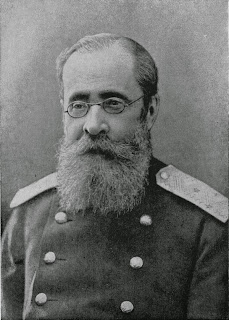- (01) Nikolai Rimsky-Korsakov - Piano Trio in C minor (completed M. Steinberg)
- (05) César Cui - À argenteau, Op. 40: No. 2, Farniente
- (06) Alexander Borodin - Piano Trio in D major
The Brahms Trio
Nikolai Sachenko, violin
Kirill Rodin, cello
Natalia Rubinstein, piano
Date: 2021
Label: Naxos
----------------------------------------------------------------------------
None of the great Russian piano trios features here – Tchaikovsky’s was on the Brahms Trio’s second volume, Taneyev’s and Shostakovich’s are presumably yet to come – and the major offerings here don’t show the true personalities of Rimsky-Korsakov and Borodin. But there’s abundant charm, craftsmanship and – in the case of Korsakov’s C minor epic completed in 1939 by his son-in-law Maximilian Steinberg – ambition. The finale, with its abundant counterpoint, feels long-winded despite the jolly third theme; but the rest flies thanks to the Russian players’ deftness – the patter and especially the triplet figures of the A major Adagioare always companionable.
César Cui’s miniature provides a pretty intermezzo, and what’s not to like about Borodin’s incomplete (finale-less) early trio of 1860? It’s pure bottled sunshine, like his later and more individual string quartets, and if Mendelssohn is the obvious model, especially in the ‘Romance’, that’s no bad thing. The biggest surprise comes last: what sounds like a genially heavy Austrian Ländler, the last completed movement is more reminiscent of a young Gustav Mahler. If the three players don’t always pull out the brilliant stops possible in the Rimsky-Korsakov, we get them throughout the Borodin.
-- David Nice, BBC Music Magazine
----------------------------------------------------------------------------
Nikolai Rimsky-Korsakov (18 March [O.S. 6 March] 1844 – 21 June [O.S. 8 June] 1908) was a Russian composer, and a member of the group of composers known as The Five. He was considered a master of orchestration. His best-known orchestral compositions are staples of the classical music repertoire, along with suites and excerpts from some of his 15 operas. Rimsky-Korsakov shaped a generation of younger composers and musicians during his decades as an educator, and is considered "the main architect" of what the classical music public considers the Russian style of composition.
***
César Cui (18 January [O.S. 6 January] 1835 – 13 March 1918) was a Russian composer and music critic of French and Lithuanian descent. He was a member of group "The Five", although Cui's works are not so nationalistic as those of the other members. As a writer on music, Cui contributed almost 800 articles between 1864 and 1918 to various newspapers and other publications in Russia and Europe. As an officer of the Imperial Russian Army he rose to the rank of Engineer-General (compared to full General), taught fortifications in Russian military academies and wrote a number of monographs on the subject.
http://en.wikipedia.org/wiki/C%C3%A9sar_Cui***
Alexander Borodin (12 November 1833 – 27 February 1887) was a Russian Romantic composer of Georgian origin, as well as a doctor and a chemist. He was one of the prominent 19th-century group of composers known as The Mighty Handful, or The Five. Borodin is best known for his symphonies, his two string quartets, the tone poem 'In the Steppes of Central Asia' and his opera 'Prince Igor'. A notable advocate of women's rights, Borodin was a promoter of education in Russia and founded the School of Medicine for Women in Saint Petersburg. As a chemist, he is best known for his work in organic synthesis.
http://en.wikipedia.org/wiki/Alexander_Borodin
http://en.wikipedia.org/wiki/Alexander_Borodin
***
The Brahms Trio is one of the leading chamber ensembles of Russia. Founded as a part of the chamber music class of Konstantin Oznobishchev at the Gnessin School of Music in Moscow in 1988, the Brahms Trio has performed worldwide and has recorded much of Russian piano trio repertoire. The Trio made a significant contribution to enlarging the chamber repertoire by rediscovering unknown piano trios of Russian composers of the late-19th and early-20th century. The musicians of the Brahms Trio are professors of the Moscow Tchaikovsky Conservatory, and recipients of multiple awards and honors.
----------------------------------------------------------------------------
FLAC, tracks
Links in comment
Enjoy!





Choose one link, copy and paste it to your browser's address bar, wait a few seconds (you may need to click 'Continue' first), then click 'Skip Ad' (or 'Get link').
ReplyDeleteIf you are asked to download or install anything, IGNORE, only download from file hosting site (mega.nz).
If MEGA shows 'Bandwidth Limit Exceeded' message, try to create a free account.
http://fumacrom.com/3tiEb
or
https://uii.io/eShXSuKG
or
https://exe.io/vJaKvehn